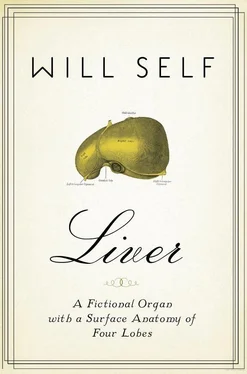Joyce had always understood, rationally, that Derry would predecease her — the X chromosome, the single malts, the many cigarettes, the sedentary job — but worse than the fear of his absence was the idea of any other presence. In the darkest days of mourning him, when she didn’t even dress herself, Joyce recoiled from the phone calls of even her closest and oldest friends, their very feminine concern. Her anxieties were half formed, and all the worse for it: the purgatorial doom of a shared scone in the caf of a National Trust property, for ever and ever and ever. Lord Jesus Christ King of glory, deliver the souls of all the faithful departed from the pains of hell .
One morning, after Joyce had been a week or so at Frau Stauben’s apartment, the two women lingered together over breakfast. Vreni was showing her photographs of the previous year’s Easter play at St Anton’s; this was, Joyce knew, her other way of memorializing Gertrud. Tossing aside the final photo — a particularly choleric cherub, tightly held by a long-suffering angel — Vreni said, ‘Ueli — Herr Weiss — he called in the night before to ask me if you are being all good.’
Joyce didn’t think this an inquiry after her moral welfare; she dug doughtily at the remains of her muesli. ‘Oh, really,’ she said, ‘I’m perfectly all right — don’t I seem all right?’
‘It is — I — it is. ’As Vreni was not someone to whom tact came naturally, she mangled on: ‘I am not knowing what is the stage of your treatments, Joyce. I am so sorry, you forgive me for not inviting this talk, but I am confused, I do not know what to say to Ueli — ’
‘You don’t have to say anything to Herr Weiss!’ Joyce snapped, and was going to add that her health was none of his business , had not Frau Stauben tipped her glasses off the end of her long, veined nose and put the doll’s eyes on Joyce. The morning sunlight was intense in the small kitchen, and a sort of nimbus edged her soft form. ‘But I am thinking,’ (Butt ai amm zinkin.) she mispronounced with great care, ‘that you are not so ill at all. You have not the look’ — she skidded into Schweizerdeutsch — ‘ Sie gsehnd n  d uus wie
d uus wie  pper wo Chr ä bs h ä tt ’ — then back out — ‘the look of a cancer person. I know this things, you see.’
pper wo Chr ä bs h ä tt ’ — then back out — ‘the look of a cancer person. I know this things, you see.’
The daughters of other women looked up at them from the table. Teenagers dressed as immaterial beings, their smiling faces blank and startled in the flash, waiting for experience to shade them in.
Without being aware of having taken her leave, or taken up her new coat, handbag and gloves, Joyce found herself outside in the street, the fairly high heels of her new shoes vigorously tapping on the paving. She followed the thread back towards the river; on the museum’s portico a muscular goddess did dancercise with the globe. Joyce walked over the bridge, then climbed the stairs beside the gothic grotto to the Lindenhof, the small park she had ventured out to from the Widder Hotel on the first night of her resurrection.
Could it be true, what the fat lady said? Could Joyce be recovering from the cancer? Phillimore had said the origin of her cancer was ‘occult’; might the dissolution of these tumours be equally mysterious?
In the dead of recent nights Joyce had awoken often, and looked across the empty twin bed to where the feline darkness rubbed against the jet windowpane. Was it outside, her cancer? Had it been put out there, to stare back in at her with eyes as round and black as an umlaut? Was it watching her body, huddled up in the duvet, for signs of defeat: the unruly cells, cowed, mending their own membranes, retreating into the milky opalescence of their cytoplasm?. fac eas, Domine, de morte Iransire ad vitam. Allow them, O Lord, to cross from death into the life .
Below her sun rays skipped, wavelet to wavelet. Pretty. Ordinary. Pretty. Beside her the Stadthäuser loomed. Sandy. Dull. Sandy. Joyce was beginning to read Zürich, a little; the individual buildings, the streets, the hills beyond — all were outlined. Some of these were filled in — with colour, texture and form — while others were simply labelled, e.g., ‘Rathaus’, and given a brief description. She went on, threading through side streets empty in the mid-morning. She had it in mind to pick up the bras she had ordered the day before yesterday — although she also knew that it was far too early.
In Bahnhofstrasse Joyce was arrested by a chocolatier’s window. Here was the inverse of the edible leather goods in the old town; the slick brown stuff , melted and poured into the moulds of quotidian things — books and biros, coins and watches. It was tempting, this parallel world of sweet substance, and Joyce tried casting herself as a little old English governess, stuffing a Gladstone bag full of it, before boarding the train that would take her home across Europe.
The train home, maybe I could take that? The plane was out of the question: if I feared death when I was on my way to commit suicide, then what would it be like now? Every jolt or jostle threatening to pop this bubble of shiny, reflective awareness? Joyce walked across the road towards the station, eyes fixed, unseeing, on the stony breasts of the gods and goddesses guarding its clock. What does Weiss want?
A group of street drinkers were clustered convivially beside a plinth, upon which a bearded patriarch was ever-striding towards an industrious Zion. Joyce thought that, this being Switzerland , they were going about the business of intoxication in a sober fashion, the only thing to distinguish them from still soberer citizens a certain lack of registration that recalled the transfers Isobel used to rub on to cardboard panoramas with a pencil. They stood — two men, two women, one brown, three white — in kinship with the drift of last autumn’s leaves. It was only when Joyce was within a few feet of them, and one of the women took a swig from her can of lager, then looked round, that she recognized her own daughter.
‘Mum — Mummy!’ Too loud, the closest living relative cried: an egregious acquaintance forcing intimacy in a crowd. The man with her was Asian — a Tamil? His face smooth — firm, yet fleshy — his lips symmetrical, his thick blue-black hair pressed down on his brow by a cream-wool hat.
Isobel set her can on the ground and rushed to embrace her unyielding mother. ‘Oh, Mummy, I was so scared. Oh, Mummy, I thought you were — ’
Dead . Joyce completed the sentence, internally, but it was Isobel she meant. She realized that Frau Stauben’s Gertrud and her own Isobel had become mushed up in her mind, both household goddesses, the objects of useless and chintzy cults.
‘Where’ve you been? I’ve been back to the hotel every day, I’ve waited there loads, they — they called the police in the end — ’
‘I’m not surprised, Isobel,’ Joyce said firmly, disengaging herself from the beery embrace.
‘Are you all right? Are you going somewhere — d’you want me to come with?’ This, all in a rush. Please take me with you, Mummy, please? The teary little face imploring among the tricycles, nurseries in those days, well, they were a bit like prisons .
‘I hardly think we want to discuss this in front of your. ’ Joyce eyed the Tamil man and the two others, who were not so respectable after all : the man had his front teeth missing, the woman an open sore by her ear. ‘. friends.’
Mother and daughter walked together into the front hall of the Hauptbahnhof: an enormous, barrel-vaulted space, with dingy light filtered down through many semicircular windows. The atmosphere was stale with diesel fumes and the odours of the departed masses. A bulgy, gilded dummy of a pierrot was dangling from the beams overhead; Joyce supposed this was meant to be public art . She stopped and said to Isobel: ‘I’m not going anywhere, I told you that already. I’m staying here, in Zürich — ’
Читать дальше

 d uus wie
d uus wie 










